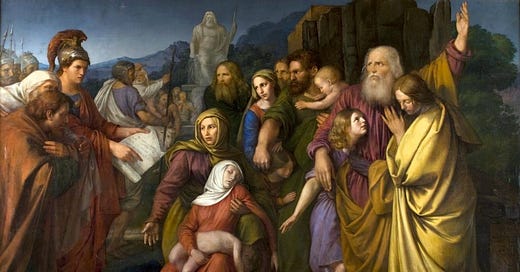The teachings of the Church are true and eternal, thanks to the guidance of the Holy Spirit, but that doesn’t mean we know and completely understand God. We can’t; God is beyond human comprehension. So, doctrine develops. It never contradicts itself, but we learn new facets of God over time.
Bishop Barron explains it better than I can—
This process has been going on for thousands of years, even before the birth of Christianity. Today, we get examples of the process, as the Apostles discover the true universality of the church, and as Jesus confirms the (relatively) recent development of the doctrine of resurrection among some Jewish sects.
There’s always more to learn, so let’s dive in!
Reading 1
Acts 11:19-26
Those who had been scattered by the persecution that arose because of Stephen went as far as Phoenicia, Cyprus, and Antioch, preaching the word to no one but Jews. There were some Cypriots and Cyrenians among them, however, who came to Antioch and began to speak to the Greeks as well, proclaiming the Lord Jesus. The hand of the Lord was with them and a great number who believed turned to the Lord.
The news about them reached the ears of the Church in Jerusalem, and they sent Barnabas to go to Antioch. When he arrived and saw the grace of God, he rejoiced and encouraged them all to remain faithful to the Lord in firmness of heart, for he was a good man, filled with the Holy Spirit and faith. And a large number of people was added to the Lord. Then he went to Tarsus to look for Saul, and when he had found him he brought him to Antioch. For a whole year they met with the Church and taught a large number of people, and it was in Antioch that the disciples were first called Christians.
Stephen traveled far and wide, but only preached to Jews. But there were some others in his entourage who preached to Gentiles.
And guess what? It worked! Many were converted.
This bothered the community in Jerusalem. Why? People are weird. We harbor prejudices; we’re parochial; we want to keep good news, even the Good News, to ourselves.
Jesus isn’t. He wants to spread the Gospels to everyone, everywhere. So when Barnabas sees the new church in Antioch, he sees Jesus among them. And so it’s at this point they have to come up with a new name for themselves, since they’re no longer just a Jewish sect.
A new word has entered the world: Christians.
Responsorial Psalm
Ps 87:1b-3, 4-5, 6-7
R. All you nations, praise the Lord.
His foundation upon the holy mountains
the LORD loves:
The gates of Zion,
more than any dwelling of Jacob.
Glorious things are said of you,
O city of God!
R. All you nations, praise the Lord.
I tell of Egypt and Babylon
among those who know the LORD;
Of Philistia, Tyre, Ethiopia:
"This man was born there."
And of Zion they shall say:
"One and all were born in her;
And he who has established her
is the Most High LORD."
R. All you nations, praise the Lord.
They shall note, when the peoples are enrolled:
"This man was born there."
And all shall sing, in their festive dance:
"My home is within you."
R. All you nations, praise the Lord.
This is a song about the exiles, in Egypt and Babylon and elsewhere. The Psalmist insists that the diaspora are still “born there,” in Zion, regardless of whether they were born in Philistia, Tyre, Ethiopia. Their bonds of faith are stronger than the dirt they happen to stand on.
Hey, do you suppose this metaphorically applies to the new Christians who weren’t born Jewish?
Alleluia
Jn 10:27
R. Alleluia, alleluia.
My sheep hear my voice, says the Lord;
I know them, and they follow me.
R. Alleluia, alleluia.
The proof that you are part of His flock is not that you were born in a particular field, but that you follow His voice.
Gospel
Jn 10:22-30
The feast of the Dedication was taking place in Jerusalem. It was winter. And Jesus walked about in the temple area on the Portico of Solomon. So the Jews gathered around him and said to him, "How long are you going to keep us in suspense? If you are the Christ, tell us plainly."
Jesus answered them, "I told you and you do not believe. The works I do in my Father's name testify to me. But you do not believe, because you are not among my sheep. My sheep hear my voice; I know them, and they follow me. I give them eternal life, and they shall never perish. No one can take them out of my hand. My Father, who has given them to me, is greater than all, and no one can take them out of the Father's hand. The Father and I are one."
The feast of Dedication is today known as Hanukkah, in case you’re wondering. It’s a celebration of the Maccabees re-dedicating the Temple.1 This isn't just trivia; it's important context for the conversation Jesus has with the Jews.2 The Books of Maccabees are deuterocanonical, which is bonkers, because the 7th chapter of 2nd Maccabees is the first time bodily resurrection is mentioned in the Bible.3
This is still a fringe belief at the time of Jesus; the Sadducees, for example, didn’t believe in resurrection. Jesus professing eternal life at the feast of the Dedication isn’t a coincidence; it’s heavy with symbolism that no 1st century Jew would miss.4
Now, to be fair to the high priests and such, Jesus never specifically said whether he was or wasn’t the Messiah, at this point in John. He’s more making a “actions speak louder than words” argument. No one but the Messiah could perform the signs and miracles Jesus did.
He’s also beginning to explain the Holy Trinity (“The Father and I are one.”) There’s a lot of developing doctrine in these nine verses, is what I’m saying.
It’s complex, but don’t worry. Our job is to listen to His voice, believe the Good News, and like the Apostles in the first reading, spread it as far as we can.
The period of Jewish history Jesus lived in is called “Second Temple Judaism.”
Meaning the Jewish leadership, in John.
It was also supposed to be adapted into a movie by famously talented weirdo Joe Eszterhas, and directed by talented, famous weirdo Mel Gibson, until they had a falling out.
Thank God for the Bible in a Year, helping explain a lot of this.





